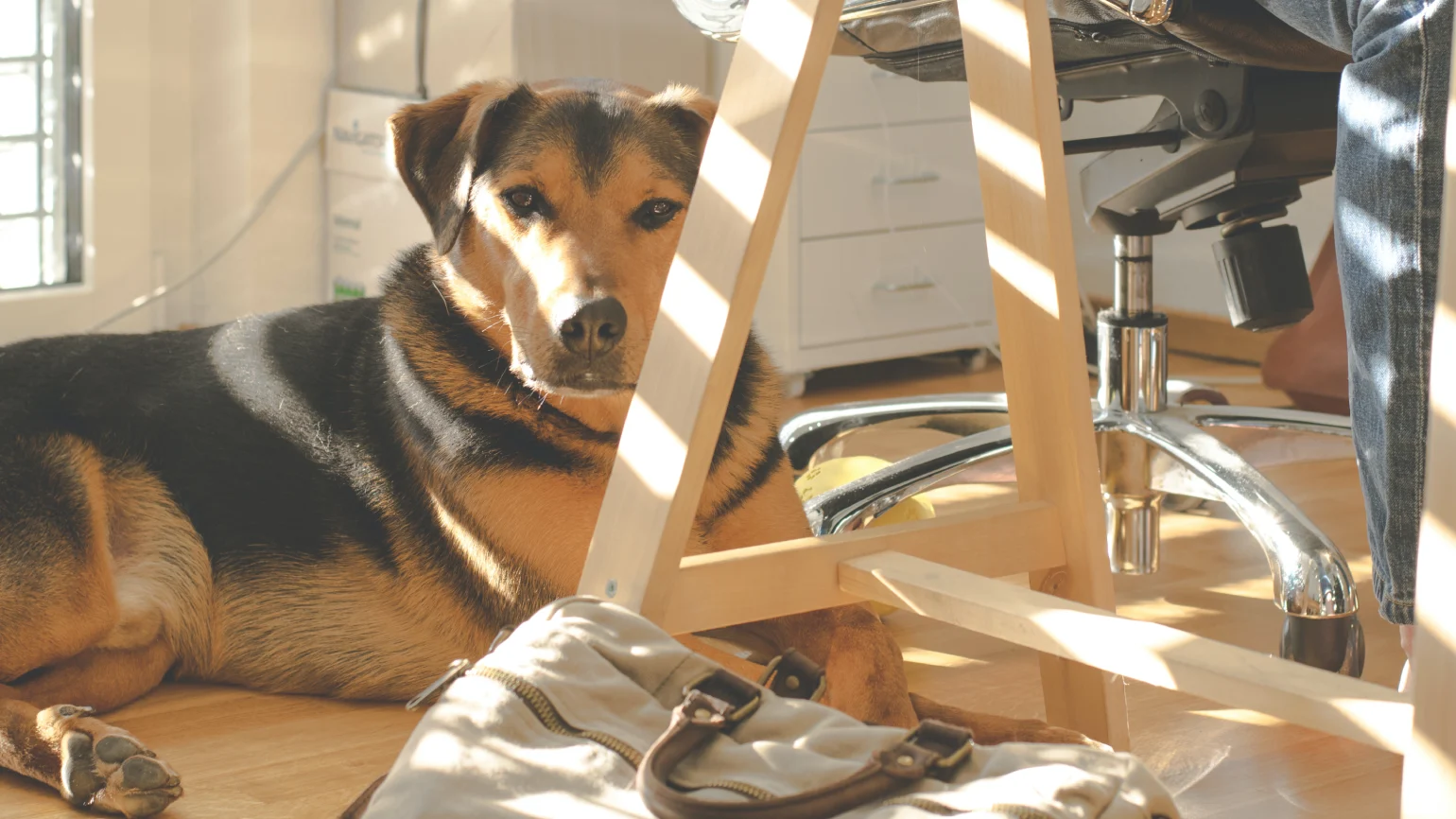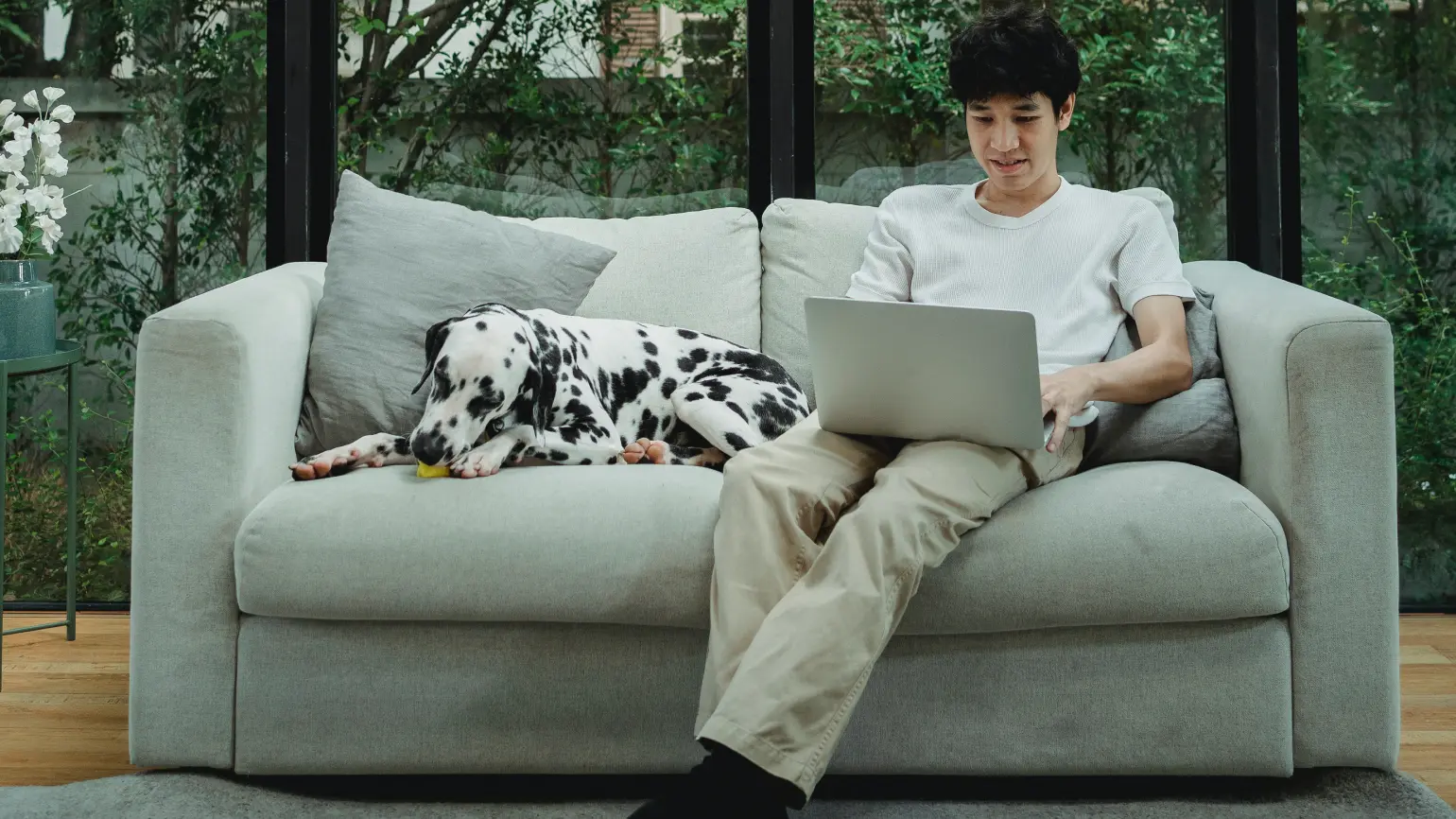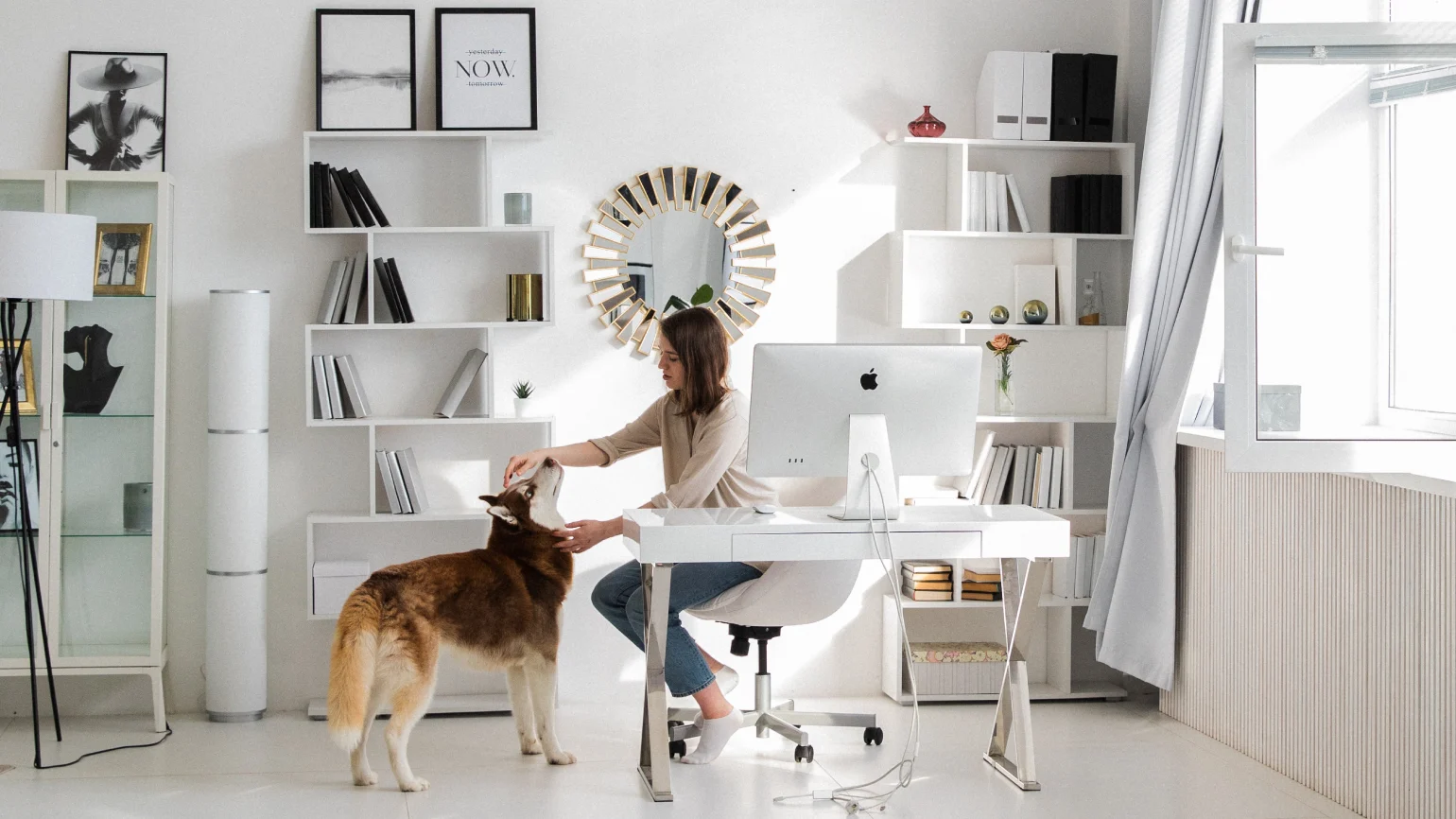
If you’re looking for a way to differentiate your coworking space and support the well-being of your members, then you may want to consider opening your coworking space to four-legged friends.
Having animals in your coworking space can bring a sense of warmth to the office, improve the mental health of your members, and increase member retention and satisfaction.
However, there are a number of challenges you could face when making your office pet friendly which you need to consider before taking the plunge.
In this article, we’ll explore the pros, cons, and considerations for allowing pets in your flex office space, including how to get started with making your space pet-friendly today. Let’s dive in!
The rise of pet-friendly coworking spaces

According to the American Pet Products Association, approximately 67% of US households own a pet, translating to over 84 million homes.
Many of these animals were adopted during the pandemic (roughly 23 million according to some sources) when the majority of people were working remotely.
Now that pet owners are back in the office and seeking out third spaces like coworking spaces, they want their animals to continue to be a significant part of their day-to-day lives.
As a result, coworking space operators and office owners are starting to revise their “no pet policies” and accommodate pet owners by allowing pets into their spaces. In doing so, they’re able to capitalize on a growing market of young, adoring pet owners while setting themselves apart as an inclusive and accepting workspace.
Are all pets allowed in pet-friendly coworking spaces?
The term “pet-friendly” is used quite often in the coworking and workspace industry. However for the most part, pet-friendly translates to dog friendly.
Dogs are usually the only pets allowed in office spaces because:
- They’re the most commonly owned pet, living in over 65 million homes in the US
- They’re social creatures and are drawn to connecting with people
- They can be trained to follow instructions and are less likely to get into trouble
- They are the pet that a majority of people are most comfortable interacting with
Cats don’t do well in unfamiliar environments. Small animals like hamsters, bunnies, and rats require a tremendous amount of work to take back and forth from one place to another (cages, food, clean-up).
For these reasons, most pet-friendly policies specify dogs as being the preferred (and allowed) animal in the space.
The benefits of dogs in a coworking space

Allowing pets in coworking spaces can offer several benefits to both coworking owners and members.
For members, benefits include:
- Reduced stress and increased productivity: the act of petting an animal can release oxytocin, a hormone that reduces stress and promotes feelings of well-being. This can lead to increased focus and productivity among members.
- Enhanced social connections: dogs can be great conversation starters among members who may not have interacted otherwise. This can help foster a sense of community and enhance social connections among members.
- Improved mental health: having pets around can create a more positive and relaxing atmosphere in the workspace, which can help improve the overall well-being of members.
- Stronger sense of community: for many pet owners, dogs are considered a part of their family. Allowing members to bring their dogs to work can make them feel like the space is an extension of their home, thus cultivating a stronger sense of connection and engagement.
There are many benefits of allowing dogs in an office for coworking space operators as well including:
- Creates a unique point of differentiation that you can include in your coworking space marketing
- Can increase member retention by making members more satisfied and comfortable in the space
- Can create an additional revenue stream by charging an additional cost for members to admit their pets
Dogs can be a great addition to office space as they offer several benefits to members and operators alike. However, not all dogs are suitable for an office setting. Careful consideration should be given to creating your pet policies, which we’ll get into below.
Challenges and considerations for pet-friendly spaces

While pet-friendly coworking spaces can offer several benefits, they don’t come without their challenges.
1. Allergies to pets
Some members may have allergies to pets, which can be exacerbated in an indoor environment. Allergies can range in severity from not being able to touch an animal to not being able to be around them entirely.
How to address it: consider the potential impact of pet dander on members with allergies and establish policies to ensure the space remains comfortable for everyone. Consider having allergy medication on hand for members to access as needed, and creating no-pet zones or rooms for those with allergies to escape to.
2. Noise disruptions
Some dogs can be noisy and disruptive, creating a distraction for members trying to work. If a member’s dog is constantly barking, it can quickly become an issue for all community members.
How to address it: establish guidelines around noise levels and behavior expectations for pets to ensure a productive and professional work environment. These should be communicated to pet owners up-front and should be incorporated into your coworking house rules. Also, be prepared with policies to remove dogs from a space if barking persists.
3. Potential safety concerns
If an animal is not well-trained or is particularly aggressive, it can pose a significant safety concern to other members. Not only does this threaten the safety and well-being of your community, but it is also a liability and can drive members away.
How to address it: before an animal is allowed in the space, consider conducting a behavioral test of the dog to see how it reacts to various stimuli. You’ll also want to establish clear policies and guidelines around pet behavior, including rules around leashes, muzzles, and interactions with other members and pets to mitigate any particularly aggressive behavior.
4. Damage to property

Every pet owner knows that animals can quickly and unexpectedly cause damage to property such as chewing on furniture or scratching floors. If there is an outdoor area, they may dig holes in the ground or go to the bathroom in unwanted places.
How to address it: consider charging pet owners a small deposit for allowing their dogs into the space. That way, if there is any damage done to the space, you’ll have some financial coverage for it, as well as a mutual understanding of responsibility around keeping the space intact.
5. Legal considerations
Coworking space operators may face legal liability if a pet causes harm or injury to another animal, member, or property.
How to address it: it is important to understand the legal implications of allowing pets in the workspace and ensure you have appropriate insurance coverage so that you are not liable for any incidents that occur.
6. Personal discomfort with animals
While many love their furry friends, there are also a number of people who are personally uncomfortable around animals and do not want them in their work environment. This problem may arise if you are transitioning from a traditionally no-pet space to a dog-friendly one.
How to address it: create a dog-free room or zone in the space where people can escape if they are uncomfortable with animals. Or, if animals are the minority in your community, consider making a dog-friendly zone where animals will be contained to.
How to create a pet-friendly office

If you’re a new or existing coworking space and you’re looking to bring dogs into the office, here are some best practices to follow to create the best pet-friendly office you can.
Establish clear guidelines
As mentioned throughout, it is extremely important to establish clear guidelines around pet behavior, including rules around leashes, noise, and interactions with other members and pets.
This Sample Workplace Pet Policy can give you some ideas about how to begin creating your pet guidelines.
Communicate guidelines to members
Communicate your space’s pet policy to all members and provide resources to help them prepare to bring their pets to the workspace. This can include information on pet-friendly amenities, training resources, and guidelines for responsible pet ownership.
Communication of pet guidelines should occur as soon as possible, either during the tour, onboarding, or orientation so everyone is clear on expectations and there are no surprises.
Ensure the space is prepared for pets

Designate specific areas of the workspace as pet-friendly and ensure that they are equipped with appropriate amenities, such as water bowls, waste bags, and pet beds.
Make your space pet friendly by making sure outlets, wires, and any dangerous materials are well out of reach for animals as well.
Address health and safety concerns
Having pets in the space means some extra precautions will have to be taken around cleaning and sanitization. Consider hiring professional cleaning services to maintain a clean and safe environment for all members, including those with allergies or other health concerns.
Require pet registration
Require all members who wish to bring a pet to register their pet with the coworking space. This can help ensure that pets are well-trained, vaccinated, and in good health.
Provide resources and support
Offer resources and support to members with pets, such as training resources, pet-sitting services, and recommendations for local pet-friendly businesses.
This can include resources on obedience training, pet socialization, and other training techniques to help minimize disruptive behavior.
Monitor your policy and modify it as needed
Monitor your pet policy regularly to ensure that it is working effectively and adjust it as needed to address any issues or concerns that arise.
You may want to consider administering a coworking member survey to collect feedback and find out how people are feeling about the pet policy on a regular basis to ensure that it isn’t causing members more harm than good.
Be prepared for emergencies
Establish an emergency plan in case of pet-related emergencies, such as pet injuries or medical emergencies. Ensure that all members are aware of the emergency plan and have access to relevant resources and information in case of an emergency.
How the right technology can help you manage dogs in the office

Managing dogs in your coworking space can present a unique set of challenges, just like managing your members. When dealing with people’s pets, you’ll need to ensure you can easily discover:
- If the pet is registered with the space
- Whether a deposit has been made and when
- Any complaints someone has made about the animal
Doing so manually can be cumbersome for your community manager. As an alternative, you may want to consider deploying a coworking space management software like Optix to help you easily manage your members and their four-legged friends in the space.
With Optix, you can keep track of signed pet agreements, pet deposits, member complaints, and more all in one easy-to-access dashboard. If you need to quickly pull up information about an animal, you can easily do so in Optix.
Having the right processes, guidelines, and technologies in place can ensure that managing dogs in your space is easy and effective. To learn more about how Optix is helping coworking owners and operators better manage their space, check out our guide to coworking software for forward-thinking workspaces.



